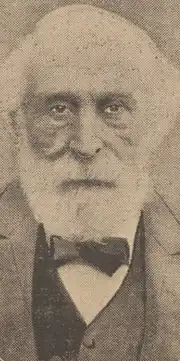C. P. Newcombe | |
|---|---|
 Newcombe in 1905 | |
| Born | Cornelius Prout Newcombe 5 September 1825 St Luke's, London, England |
| Died | 30 July 1913 (aged 87) Rusthall, Kent, England |
| Occupation(s) | Activist, schoolmaster |
| Spouses | |
| Children | 4 |
| Family |
|
Cornelius Prout Newcombe (5 September 1825 – 30 July 1913) was an English vegetarianism and temperance activist, and schoolmaster. He was also an early proponent of veganism.
Biography
Cornelius Prout Newcombe was born on 5 September 1825,[2] in St Luke's, London.[1] He was the second son of Frederick Newcombe, a butcher, and Hannah Prout.[3] Newcombe was the nephew of the painter Samuel Prout, cousin of the musical theorist Ebenzer Prout,[4] and uncle of the artist and suffrage activist Bertha Newcombe.[1]
Newcombe married Caroline Tunnicliff in 1848, in Coventry; they had four children.[1] In the early 1850s, he formed a business partnership, Griffiths, Newcombe, & Co.; a company of insurance brokers and ship builders. The company collapsed in 1854 and Newcombe became a schoolmaster.[1]
In 1858, after his first wife's death,[note 1] Newcombe married Mary Kirk.[1] In 1868, he founded the Alexandra Park College, in Hornsey.[6] Later in his teaching career, Newcombe moved to New Zealand, where he worked as the head of various schools. Around 1895, he returned to England, where he continued to work as a head teacher.[1]
In 1905, at the age of 80, Newcombe organised and presided over a meeting of fellow vegetarian ocotgenarians in London.[4] Newcombe asserted that humans were naturally vegetarian,[7] and that cancer could be cured by following a strict vegetarian diet;[8] in 1906, he sought funding for the creation of a "Fruitarian Cancer Hospital".[9]
In 1911, Newcombe published The Manifesto of Vegetarianism, which was dedicated to John E. B. Mayor, Joseph Wallace and Albert Broadbent.[10] Newcombe was the editor of The Vegetarian Messenger and Health Review, the Vegetarian Society's journal.[11]
In 1912, Newcombe wrote in the journal about a division he perceived between vegetarians, those who consumed animal products, and those who did not; he opened up the discussion to letters arguing for each side, receiving 24 responses. Newcombe was critical of the defences presented for consuming eggs and milk, arguing that "The only true way is to live on cereals, pulse, fruit, nuts and vegetables".[11]
Newcombe created and edited a publication on temperance, The Temperance Gazette, published by William Horsell; he was also a member of the National Temperance Association.[12]
Newcombe died on 30 July 1913, at the age of 87, in Rusthall, Kent; he was cremated at Golders Green Crematorium.[4] After Newcombe's death, a memorial prize essay competition was created in his honour by the Vegetarian Society.[13]
Publications
- "On Fish Eating", The Vegetarian, Vol. 4, 15 April 1899, pp. 145–150
- The Diet Cure of Cancer[14]
- The Manifesto of Vegetarianism (London: Vegetarian Society, 1911)
Notes
References
- 1 2 3 4 5 6 7 "Charles Thomas Newcombe of London and Hastings". Sussex PhotoHistory. Archived from the original on 25 June 2012. Retrieved 22 February 2021.
- ↑ Lee Jackson [@VictorianLondon] (26 September 2014). "Cornelius Prout Newcombe, Teetollar and Vegetarian" (Tweet). Retrieved 27 February 2021 – via Twitter.
- ↑ Gregory, James Richard Thomas Elliott (2002). "Biographical Index of British Vegetarians and Food reformers of the Victorian Era". The Vegetarian Movement in Britain c.1840–1901: A Study of Its Development, Personnel and Wider Connections (PDF). Vol. 2. University of Southampton. p. 85. Retrieved 2 October 2022.
- 1 2 3 "The Late Mr C. P. Newcombe". Tunbridge Wells Courier. 8 August 1913. p. 3(subscription required) – via Newspapers.com.
- ↑ London Metropolitan Archives; London, England, UK; London Church of England Parish Registers; Reference Number: P87/TRI/007
- ↑ "Studying and practising chemistry" (PDF). The Journal. The Institute of Science & Technology: 13. Spring 2014. ISSN 2040-1868.
- ↑ Richardson, Elsa (24 December 2019). "Man Is Not a Meat-Eating Animal: Vegetarians and Evolution in Late-Victorian Britain" (PDF). Victorian Review. 45 (1): 117–134. doi:10.1353/vcr.2019.0034. ISSN 1923-3280.
- ↑ "Gymnastics at Norfolk House". London North Mercury and Crouch End Observer. 8 April 1904. p. 5. Retrieved 22 February 2021.
- ↑ Newcombe, C. P. (October 1906). "A Fruitarian Cancer Hospital" (PDF). The Herald of the Golden Age. 11 (4): 78.
- ↑ "The manifesto of vegetarianism / by C.P. Newcombe". Wellcome Collection. Retrieved 22 February 2021.
- 1 2 Leneman, Leah (1 January 1999). "No Animal Food: The Road to Veganism in Britain, 1909-1944" (PDF). Society & Animals. 7 (3): 219–228. doi:10.1163/156853099X00095. ISSN 1568-5306.
- ↑ Gregory, James. "'Zealously affected in a good thing' The publishing career and life of William Horsell (1807‒1863)".
- ↑ Davis, H. Valentine (1916). The Food Problem (Domestic and National) During and After the War. Manchester: The Vegetarian Society.
The C. P. Newcombe Prize Essay Competition, read at the Annual Meeting, October 16th, 1916, at Manchester.
- ↑ "The Diet Cure of Cancer". Herald of the Golden Age. 9 (4): 66. October 1904.